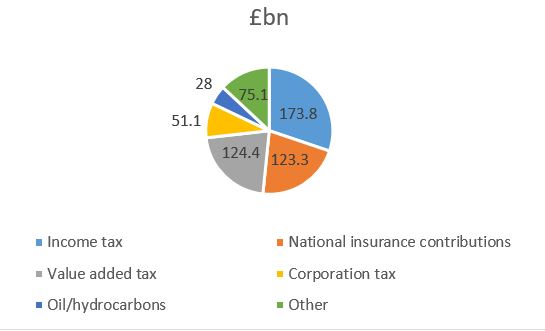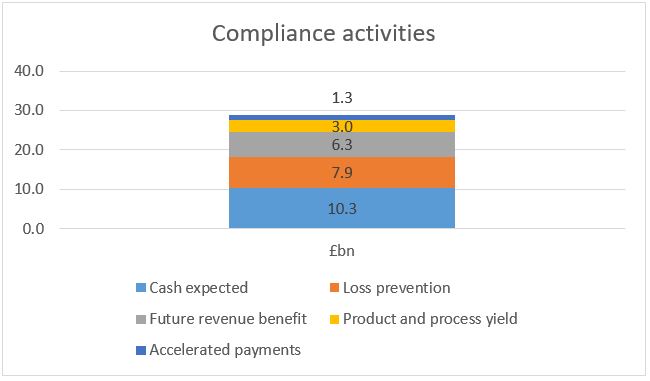11 December 2017
HMRC’s latest annual report revealed the overall effects of their tougher regime in tackling tax evasion and fraud. Compliance activity is, broadly speaking, what was a few years ago referred to as investigation and enforcement. The headline figure for 2016/17 is £28.9bn, representing the additional tax raised by these activities.
To put this figure into context, the total tax take in the UK in 2016/2017 was £574.9bn, an increase of £38.1bn on the previous year. Income Tax was the largest component at £173.8bn, followed by VAT (£124.4bn) and NICs (£122.3bn).
The amount raised by compliance activities is greater than the target of £27bn and is £840m higher than the previous year. The range of activities falling within the definition is quite diverse:
By way of explanation:
- Cash expected is the amount to be collected from concluded investigations after making allowance for bad debt
- Loss prevention includes intercepting fraudulent claims and disrupting criminal activity
- Future revenue benefits means the effects of changing taxpayers’ behaviour
- Product and process yield refers to legislative changes and closing loopholes
- Accelerated payments result from Accelerated Payment Notices (APNs) issued to users of tax avoidance schemes
The number of APNs issued last year was 30,000. The number of prosecutions was 886.
In the first chart the £75.1bn described as ‘other’ includes £5.2bn from Inheritance Tax (increased from £4.1bn in 2015/16) and £8.4bn from Capital Gains Tax (increased from £7.3bn).
Wealthy individuals (those earning above £150,000 or with a net worth of more than £1m) contributed £900m in compliance yield and £54bn in tax receipts.
The tax affairs of more than 100 footballers, 39 clubs and 13 agents are currently under investigation. Since 2014/15, HMRC has raised £269m in extra tax from its investigations into the football industry.
It is interesting to note that of the £28.9bn compliance yield only £3.4bn was raised from small and medium-sized enterprises and of this 49% was VAT, either from fraud, failure to register or simple failure to pay.
It may be unfair to regard this issue as a struggle between HMRC and the taxpayer. Nevertheless, taxpayers and their agents are ’fighting back’ where appropriate; 90 judicial reviews were commenced in 2016/17 compared to 76 in the previous year. Judicial review is the process of challenging the lawfulness of public authority decisions in the High Court. The reviews are frequently used to challenge HMRC if they fail to follow their own guidance or contradict a previous ruling. Those bringing cases are often ordinary individuals and for small amounts, but they are increasingly being brought by large corporations.
What we can learn from this is that HMRC, under intense political and public pressure, are becoming more efficient at collecting revenue. Artificial tax avoidance schemes are increasingly being closed down at significant cost to their participators, and those who seek to evade Capital Gains Tax and Inheritance Tax liabilities are increasingly at risk of being discovered. However, the average SME owner is not generally being targeted, except in the area of Value Added Tax. As we are sometimes reminded, VAT is the tax which is the most simple in its concept but has perhaps become the most complex and far-reaching in its application.
If you are not registered for VAT but think you are borderline, or if your business has complexities (such as exporting, importing, or partial exemption) and you have any doubts at all as to whether you are compliant why not speak to your usual UHY partner and request a review? Don’t become part of next year’s compliance yield statistics!
Alternatively, fill out our contact form here to get in touch.




